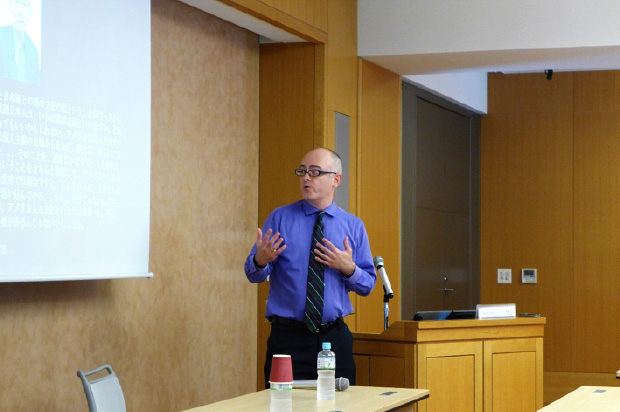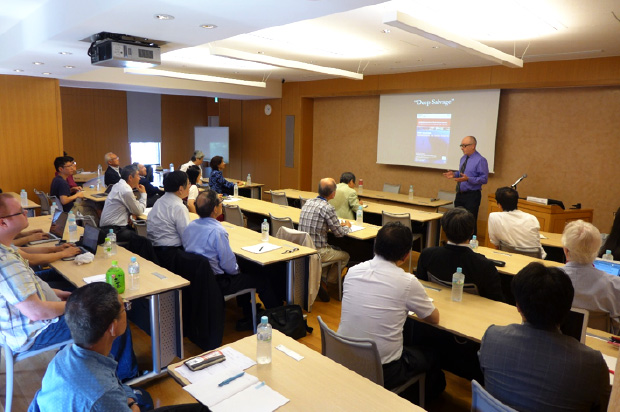SSU Forum with Professor David Leheny
| Date: | Friday, July 10 2015, 10:30-12:00 |
|---|---|
| Venue: | Seminar Room, 3rd Floor, Ito International Research Center |
| Subject: | “The Rhetoric of Emotion: Ehime-maru, Japan, and the United States” |
| Lecture: | David Leheny, Professor of East Asian Studies, Princeton University |
| Language: | English |
| Hosted by: | Security Studies Unit, Policy Alternatives Research Institute, the University of Tokyo |
The Security Studies Unit was delighted to host David Leheny, Professor of East Asian Studies at Princeton University, who delivered a talk entitled “The Rhetoric of Emotion: Ehime-maru, Japan, and the United States”.
The session was chaired by SSU Director Professor Kiichi Fujiwara, who introduced the guest speaker by highlighting the great value of his contribution to the study of East Asian and Japanese politics, particularly in consideration of his ability to concentrate on aspects of political life which often escape conventional narratives. This is especially true for his study of norms and ideas, he develops outside the standard constructivist approach. He is the author of Think Global, Fear Local: Sex, Violence, and Anxiety in Contemporary Japan (2009) and of The Rules of Play: National Identity and the Shaping of Japanese Leisure (2003). Professor Leheny thanked Professor Fujiwara for the kind introduction, and recalled the time when he worked as a junior colleague of Professor Fujiwara's at the University of Tokyo, and learned a great deal from him. He then introduced the topic of the talk, which consists of a paper eventually to be included in a book he is currently writing about the politics of national emotions, whose title shall be “The Empire of Hope: The Melodramatic Politics of Japanese Decline”.

There exists a voluminous literature on emotions and politics, from different angles, namely from a neuroscience to a communication studies approach. However, statistical work on emotions using neuronal emotional states have been delivering limited results. Other studies demonstrate how beliefs, also political ones, are not simply rational but infused with emotions, with some authors highlighting the importance of such dimension when discussing “emotional diplomacy”.
Professor Leheny intends to show, by studying several episodes of recent Japanese international politics, how narratives are constantly infused with emotions, and that those emotions matter for the construction of complex identities, and international relations.
He therefore presented the story of the Ehime-maru, a long-range off shore fishery high school training boat which collided with the Los Angeles-class submarine USS Greeneville (SSN-772) 9 February 2001, resulting in the death of nine of her crew members, including four high school students. Because of the seriousness of the accident and the complex US-Japan relations, including war memories and recent case of abuses committed by US soldiers stationed in Japan, the story had huge resonance. Besides paying for compensation, and contrary to the normal praxis in similar cases, the US agreed to a large-scale operation for the recovery of the boat and the bodies. This happened also as a consequence of the different cultural orientations of Americans and Japanese, and the ways in which their dead are honoured.

Several sources are used by Professor Leheny to describe the emotional dynamics of this story, those involving US Navy and Japanese Maritime Self-Defence Force officers, the relatives of the victims, and the submarine commander, who successively travelled to Japan to deliver personal apologies after the official inquiry was closed. Besides the emotions felt by each of these individuals, there seems to be a set of “national emotions”, related but also distinguished from the former, which has to be explored and better understood.
Together with other stories, the tragedy of the Ehime-maru is going to be part of Professor Leheny's upcoming work on the way in which collective emotions have shaped and continue to shape Japanese international politics.
-
Professor of East Asian Studies, Princeton University
